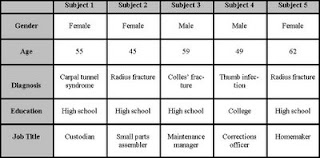Empirical vs. innate knowledge in sensory integration

I received an email from the Sensory Processing Disorder Foundation about today's NY Times article discussing the process of how disorders are included in the DSM. The email expressed excitement that awareness of sensory processing disorder was growing. I think that awareness of any problems that children have that can impact their ability to function is good - but I remain unconvinced that we are anywhere near ready for DSM inclusion of sensory processing disorder, if such a unitary disorder even exists. I have blogged about this topic before here . As the title of this entry suggests, my primary sticking point is the problem of empiricism vs. innatism. Empirical analysis suggests a process where there is NO prior knowledge and everything learned is written upon the 'blank slate' of consciousness. One could argue that the seedwork of sensory integration research completed by Ayres was the closest that we may come to a truly empirical approach to the issue of sensory in...



